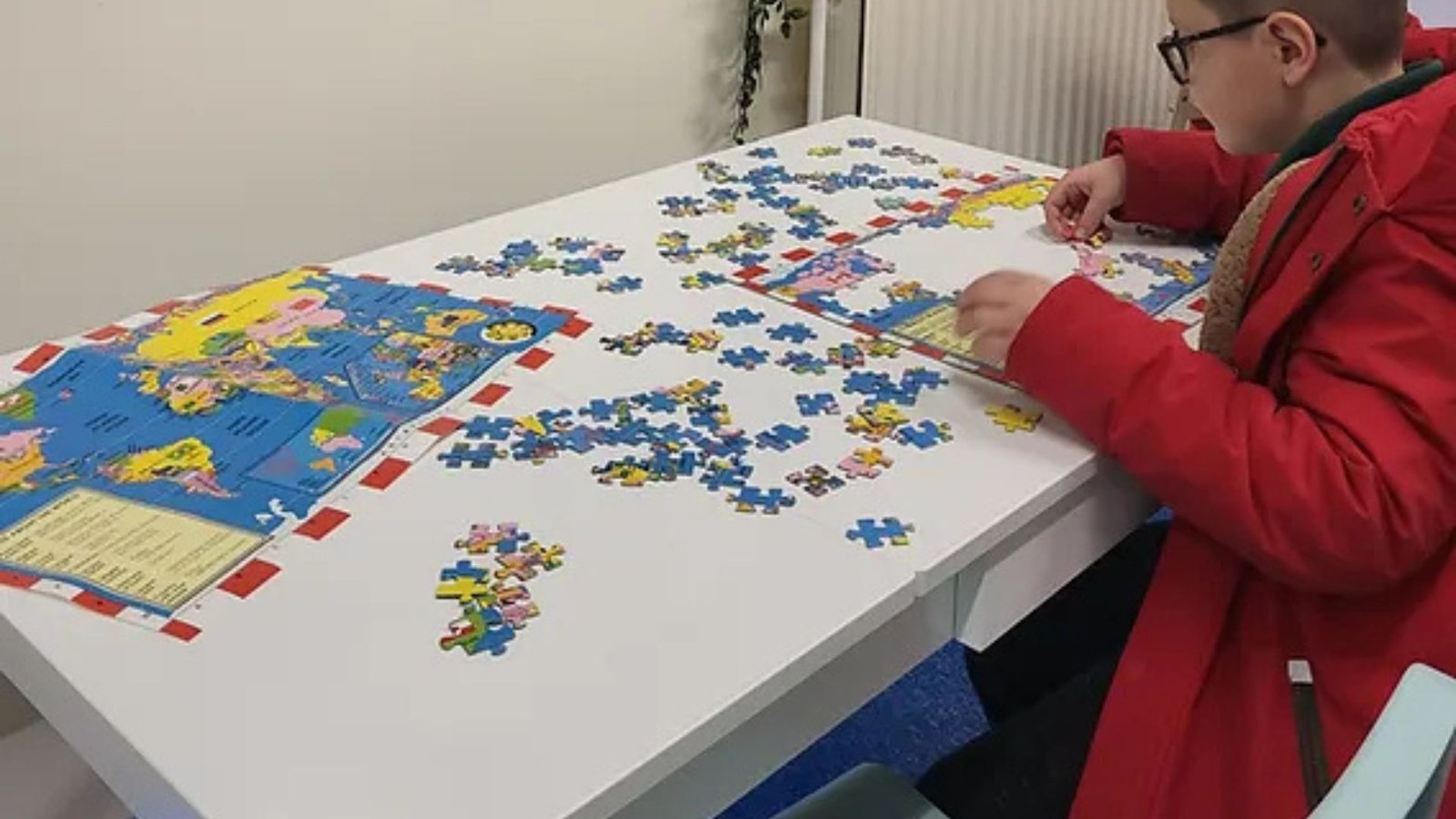Jigsaw puzzles are not just a fun pastime; they are also a great way to boost your brain health. Whether you’re piecing together a simple image or tackling a challenging puzzle, these activities can have lasting benefits for your cognitive function and memory. In this article, we’ll explore how jigsaw puzzles help improve cognitive function and memory, and why they are so effective in keeping your brain sharp.

1. Enhancing Problem-Solving Skills
Solving jigsaw puzzles involves critical thinking and problem-solving, two essential cognitive functions. As you work on a puzzle, you analyze the pieces, consider possible connections, and test solutions. This process challenges your brain to think strategically, helping you develop problem-solving skills that can be applied to real-life situations.
How puzzles improve problem-solving is by forcing you to think creatively and logically. Every puzzle piece offers new possibilities, and figuring out how they fit together requires patience, analysis, and strategy. These mental exercises keep your brain active and engaged, which strengthens your cognitive abilities over time.
2. Boosting Short-Term Memory
Jigsaw puzzles are an excellent way to improve short-term memory. As you work through the puzzle, you need to remember the shapes, colors, and patterns of the pieces you’ve already placed. This repetitive process strengthens your memory as you recall information about the pieces and try to remember where certain ones might fit.
How puzzles boost short-term memory is by encouraging the brain to retain and retrieve information repeatedly. By constantly recalling details, your brain becomes better at remembering and organizing new information, which can have a positive effect on your memory retention in everyday life.
3. Improving Visual-Spatial Reasoning
When solving a jigsaw puzzle, you must visualize how pieces will fit together in the larger picture. This requires strong visual-spatial reasoning skills, which are crucial for tasks such as navigation, organizing, and understanding patterns. Regularly solving puzzles helps develop these skills by encouraging you to mentally rotate pieces and understand how they align within the overall design.
How visual-spatial reasoning improves with puzzles is by training your brain to think in terms of shapes, sizes, and spatial relationships. These abilities are important for many tasks, such as driving, drawing, or even understanding graphs and charts. With consistent puzzle-solving, you can improve your ability to process visual information.
4. Increasing Attention and Focus
Jigsaw puzzles require you to concentrate on the task for extended periods. Whether you’re looking for the right piece or trying to fit it into a specific spot, maintaining focus is essential. By engaging in this activity, you improve your ability to pay attention to details and remain focused for longer periods, which can transfer to other areas of your life.
How puzzles improve focus and attention is by training the brain to block out distractions and concentrate on the task at hand. The longer you work on a puzzle, the more your attention span will increase. This benefit is especially helpful for students, professionals, or anyone looking to enhance their ability to focus on complex tasks.
5. Stimulating Long-Term Memory
In addition to improving short-term memory, jigsaw puzzles can also stimulate long-term memory. As you work through the puzzle, you may recall similar patterns or images from past puzzles. Your brain taps into past experiences and retrieves stored information, which helps strengthen long-term memory.
How long-term memory benefits from puzzles is through the repeated practice of recalling and applying knowledge. Solving puzzles regularly can help you retain new information and boost your ability to remember past experiences. This exercise is particularly beneficial as we age, helping to keep long-term memory sharp.
6. Enhancing Critical Thinking Skills
Jigsaw puzzles also enhance critical thinking by requiring you to evaluate different solutions and make decisions based on logic and reasoning. Each time you attempt to fit a piece, you are engaging in critical thinking as you analyze the situation, make judgments, and adjust your approach.
How puzzles promote critical thinking is by encouraging you to evaluate the puzzle from multiple angles. The process of determining where each piece fits requires judgment, logic, and assessment, which strengthens your overall cognitive abilities. Critical thinking is an important skill for academic and professional success, making jigsaw puzzles a great tool for cognitive development.
7. Promoting Mental Flexibility
Mental flexibility refers to the ability to switch between different tasks or perspectives easily. Solving jigsaw puzzles requires mental flexibility as you adapt your strategy when a piece doesn’t fit or you need to change your approach. This kind of cognitive flexibility helps you become more adaptable in everyday life, making it easier to adjust to new situations or challenges.
How mental flexibility is developed with puzzles is by encouraging you to rethink your approach and consider multiple solutions. Whether you’re switching pieces or adjusting your strategy, jigsaw puzzles help train your brain to be flexible and open to new ways of solving problems.
8. Reducing Cognitive Decline in Older Adults
For older adults, solving jigsaw puzzles can be particularly beneficial in reducing cognitive decline. Studies have shown that engaging in mentally stimulating activities like puzzles can help delay the onset of memory-related conditions, such as dementia or Alzheimer’s. The brain activity involved in puzzle-solving keeps cognitive functions sharp and helps maintain mental health.
How puzzles support cognitive health in older adults is by providing regular mental stimulation. As we age, it becomes more important to challenge our minds to maintain cognitive health. Solving jigsaw puzzles regularly can act as a protective measure against cognitive decline by keeping the brain active and engaged.
9. Providing a Relaxing Mental Workout
Jigsaw puzzles provide a relaxing way to exercise your brain. Unlike other activities that may cause stress or anxiety, working on a puzzle allows you to unwind while still stimulating your brain. This balance between relaxation and cognitive exercise makes puzzle-solving a great way to de-stress while keeping your brain sharp.
How puzzles promote relaxation while boosting brain function is by providing a quiet, focused activity that engages the brain without overwhelming it. This relaxing mental workout not only improves cognitive function but also helps reduce stress and anxiety, making it an excellent form of mental exercise.
Conclusion
In conclusion, how jigsaw puzzles help improve cognitive function and memory is clear. By enhancing problem-solving skills, boosting memory, increasing attention, and promoting mental flexibility, jigsaw puzzles are an excellent tool for maintaining and improving brain health. Whether you are a child, adult, or senior, regularly solving puzzles can provide numerous cognitive benefits that help sharpen your mind and improve your memory.



